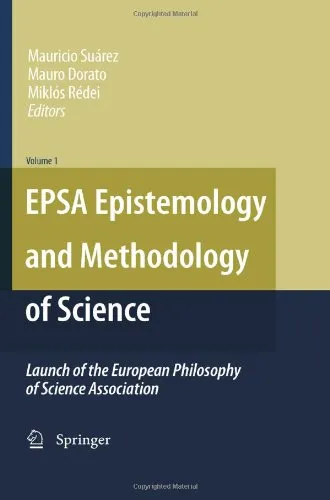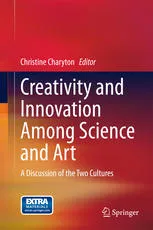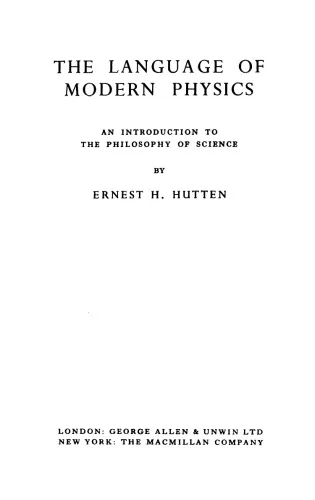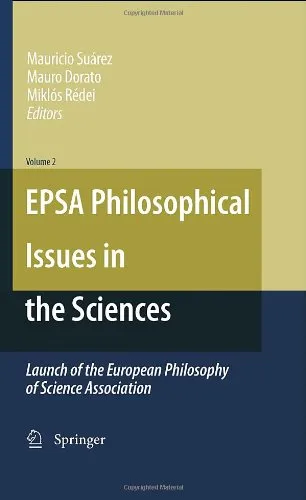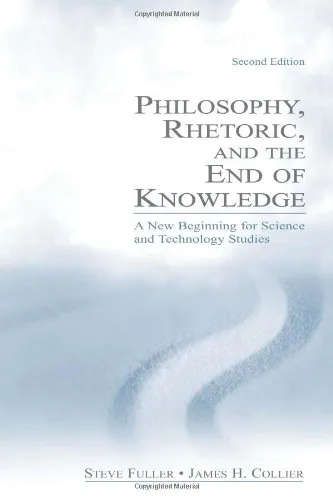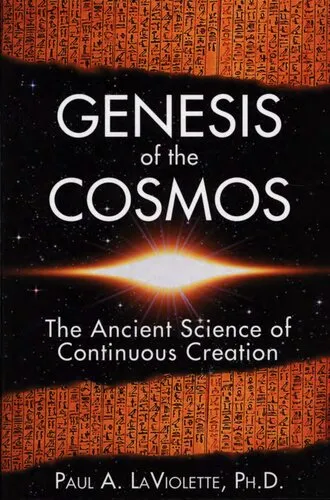EPSA Epistemology and Methodology of Science: Launch of the European Philosophy of Science Association
4.5
بر اساس نظر کاربران

شما میتونید سوالاتتون در باره کتاب رو از هوش مصنوعیش بعد از ورود بپرسید
هر دانلود یا پرسش از هوش مصنوعی 2 امتیاز لازم دارد، برای بدست آوردن امتیاز رایگان، به صفحه ی راهنمای امتیازات سر بزنید و یک سری کار ارزشمند انجام بدینکتاب های مرتبط:
مقدمهای بر کتاب EPSA Epistemology and Methodology of Science
کتاب EPSA Epistemology and Methodology of Science یکی از آثار کلیدی در زمینه فلسفه علم است که به مناسبت تشکیل انجمن فلسفه علم اروپا (European Philosophy of Science Association) نوشته شده است. این کتاب با گردآوری مقالات و مطالب پژوهشگران برجسته، تلاش میکند تا چشمانداز تازهای از معرفتشناسی و روششناسی علم ارائه دهد.
خلاصهای از کتاب
این کتاب مجموعهای از مقالات پژوهشی را مشتمل بر موضوعات گوناگون در حوزه معرفتشناسی علم (Epistemology of Science) و روششناسی علم (Methodology of Science) گردآوری کرده است. نویسندگان مختلف، از جمله دانشمندان و فیلسوفان مطرح، نقش کلیدی فلسفه در فهم علم را برجسته میکنند. از مسائل بنیادی همچون مناسبات میان نظریه و مشاهده گرفته تا بررسی دقیقتر مفاهیم مدرن مانند ابطالپذیری (Falsifiability)، احتمال (Probability)، و واقعگرایی علمی (Scientific Realism)، در این کتاب بحث شده است. علاوه بر این، این کتاب بر چالشهای مرتبط با روشهای میان رشتهای نیز تمرکز دارد، که در قرن بیستویکم نسبت به گذشته اهمیت بیشتری پیدا کردهاند.
نکات کلیدی کتاب
- تحلیل عمیق رابطه بین نظریه و تجربه در علم
- نقد و بررسی دیدگاههای مختلف درباره توضیح و پیشبینی در نظریههای علمی
- بحث در مورد Ethics و ارزشها در علم
- بررسی فلسفه علوم طبیعی و همچنین علوم اجتماعی
- بررسی امکان و محدودیتهای اندیشههای مکانیکی و علیت (Causality) در فیزیک و زیستشناسی
جملات معروف از کتاب
"Science is not merely a collection of facts; it's a dynamic interplay of theories, observations, and interpretations."
"Epistemology and methodology are the twin rails of the train of intellectual inquiry, guiding science through the labyrinth of nature."
چرا این کتاب مهم است؟
این کتاب نهتنها برای متخصصان فلسفه علم، بلکه برای کسانی که عمیقاً به سوالات پایهای در مورد علم علاقه دارند، یک راهنمای ارزشمند است. اهمیت این کتاب در این است که مسائل مهم و کلیدی را در زمینههای مختلف علم بررسی میکند و به فیلسوفان، دانشمندان و خوانندگان علاقهمند کمک میکند درک عمیقتری از مبانی معرفتشناسی و روششناسی به دست آورند. بعلاوه، با آغاز به کار انجمن فلسفه علم اروپا، این کتاب بهنوعی نقطه عطفی برای توسعه این حوزه علمی محسوب میشود.
در نهایت، کتاب EPSA Epistemology and Methodology of Science نقش بسیار مهمی در تقویت گفتگوهای میان رشتهای و جامعتر کردن فهم ما از جهان طبیعی و اجتماعی ایفا میکند.
Introduction to "EPSA Epistemology and Methodology of Science: Launch of the European Philosophy of Science Association"
The book "EPSA Epistemology and Methodology of Science: Launch of the European Philosophy of Science Association" represents a pivotal moment in the development of contemporary philosophy of science. Edited by Daniel Andler, Mauricio Suárez, Mauro Dorato, and Miklós Rédei, the volume brings together diverse contributions from leading scholars within this flourishing field. Published as part of the launch of the European Philosophy of Science Association (EPSA), the book stands as a testament to the strength and vitality of this intellectual movement. Its primary aim is to advance our understanding of the epistemological and methodological underpinnings of science through critical essays and discussions.
The book emerges at a time when philosophy of science is becoming increasingly interdisciplinary, extending its interactions into physics, biology, economics, and cognitive sciences. The contributors seek to bridge theoretical frameworks and practical issues, emphasizing the importance of philosophical inquiry in modern scientific practice. Whether you are a seasoned philosopher, an emerging researcher, or simply an intellectually curious reader, this book offers invaluable insights into both the foundational questions and real-world applications of the philosophy of science.
Detailed Summary of the Book
This landmark text is organized into key themes that explore a wide array of subjects central to the epistemology and methodology of science. Among the discussions are the nature of scientific explanation, the structure of theories, and the role of probability and statistical inference. The book delves deeply into the concept of scientific realism, analyzing its implications for understanding the world and representing phenomena. Additionally, issues concerning causation, laws of nature, and the demarcation of science from pseudoscience are rigorously examined.
A defining feature of the book is its international and collaborative outlook. Scholars from diverse countries and traditions contribute to crafting an inclusive dialogue that reflects the global nature of scientific inquiry. The contributions are prefaced by the overarching goal of fostering philosophy of science as a European initiative, suggesting a collaborative, interdisciplinary approach that transcends national borders.
The essays are structured to not only address long-standing debates but also engage with emerging questions in rapidly advancing disciplines like quantum mechanics, climate science, and artificial intelligence. Methodological pluralism—the notion that there is no single universal method applicable across all sciences—receives considerable attention, making the book indispensable for anyone interested in contemporary discussions on scientific practice.
Key Takeaways
- The philosophy of science continues to evolve, embracing interdisciplinary research and collaboration.
- Foundational topics like causation, explanation, and scientific realism remain central to ongoing philosophical debates.
- New frameworks for understanding scientific progress are necessary, particularly in rapidly advancing fields like AI and biotechnology.
- Philosophy plays a crucial role in the interpretation and ethical implications of scientific discovery.
- The EPSA initiative underlines the importance of a global and collaborative approach in philosophy of science.
Famous Quotes from the Book
"Science is not simply a body of knowledge; it is also a method and a philosophy, ever-changing in response to new discoveries and challenges."
"The quest for understanding the nature of scientific theories is ultimately a quest for understanding ourselves and our place in the universe."
"In bridging the gap between philosophy and the sciences, we find not divergence, but interconnected threads that weave the fabric of human knowledge."
Why This Book Matters
Modern science is both a driver of technological revolution and a deep wellspring of philosophical questions. "EPSA Epistemology and Methodology of Science" is significant because it contextualizes the philosophy of science within the broader landscape of contemporary research and knowledge production. The book celebrates the launch of the EPSA, a major initiative to foster dialogue and collaboration within Europe and beyond.
The volume’s relevance is underscored by its balanced focus on theory and practice. It does not merely celebrate historical contributions; it also sets the stage for future developments in the philosophy of science, promoting a forward-looking vision. By addressing pressing scientific and philosophical issues with clarity and rigor, this book makes itself a cornerstone text for anyone deeply engaged in understanding science's transformative role in society.
Above all, this book matters because it challenges the reader to think critically about science, not only as an empirical enterprise but as a profound human endeavor shaped by ethics, culture, and reason.
دانلود رایگان مستقیم
شما میتونید سوالاتتون در باره کتاب رو از هوش مصنوعیش بعد از ورود بپرسید
دسترسی به کتابها از طریق پلتفرمهای قانونی و کتابخانههای عمومی نه تنها از حقوق نویسندگان و ناشران حمایت میکند، بلکه به پایداری فرهنگ کتابخوانی نیز کمک میرساند. پیش از دانلود، لحظهای به بررسی این گزینهها فکر کنید.
این کتاب رو در پلتفرم های دیگه ببینید
WorldCat به شما کمک میکنه تا کتاب ها رو در کتابخانه های سراسر دنیا پیدا کنید
امتیازها، نظرات تخصصی و صحبت ها درباره کتاب را در Goodreads ببینید
کتابهای کمیاب یا دست دوم را در AbeBooks پیدا کنید و بخرید
1598
بازدید4.5
امتیاز0
نظر98%
رضایتنظرات:
4.5
بر اساس 0 نظر کاربران
Questions & Answers
Ask questions about this book or help others by answering
No questions yet. Be the first to ask!
